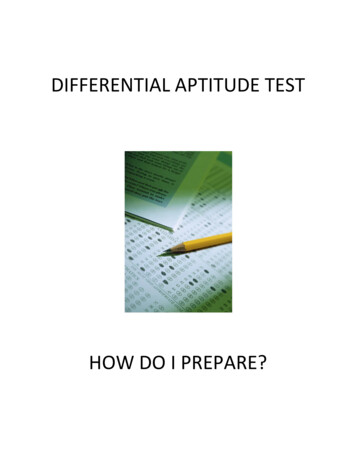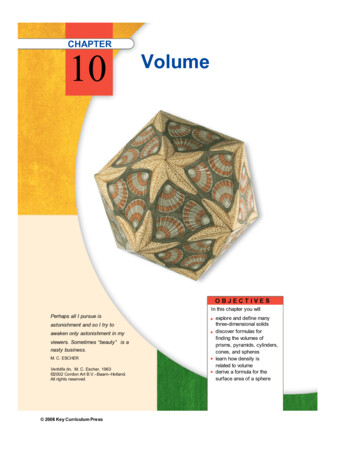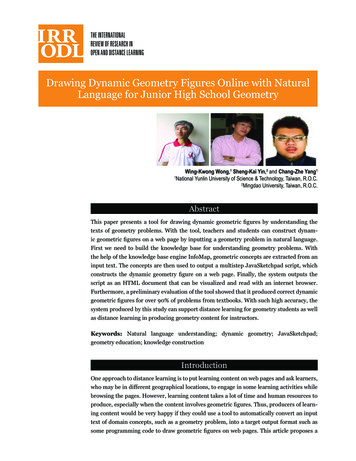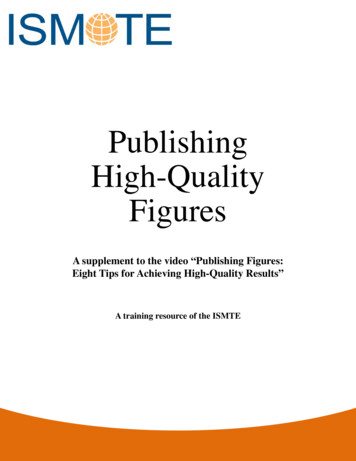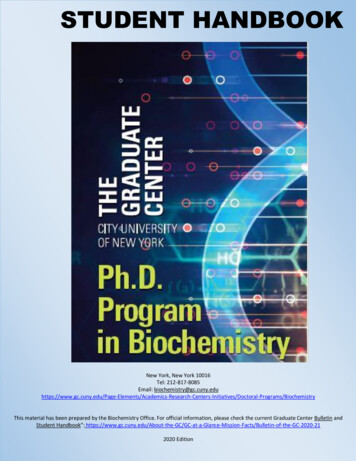
Transcription
STUDENT HANDBOOKpage 1New York, New York 10016Tel: 212-817-8085Email: /Doctoral-Programs/BiochemistryThis material has been prepared by the Biochemistry Office. For official information, please check the current Graduate Center Bulletin andStudent Handbook”: e-Mission-Facts/Bulletin-of-the-GC-2020-212020 Edition
page 2CONTENTS1.2.3.INTRODUCTION . 4LEARNING GOALS OF THE BIOCHEMISTRY PhD PROGRAM. 6REQUIREMENTS FOR THE DOCTOR OF PHILOSOPHY DEGREE . 73.1 Course Credit73.2 First Examination73.3 Second Examination73.4 Advancement to Candidacy73.5 Dissertation83.6 Satisfactory Progress83.7 Required Research Training - CITI Program93.7.1. Responsible Conduct of Research93.7.2. Research Ethics and Compliance93.8 Human Subjects Research Approval93.9 Time Limit for the Doctoral Degree93.10 Residency103.11 Teaching104. ADVISEMENT OF NEW STUDENTS . 104.1 Executive Officer/Program Office Information104.2. Deputy Executive Officers at Campuses105. PATHWAY TO DEGREE . 115.1 Standard Track115.2 Molecular Biophysics Track125.3 Advanced Courses135.3.1 Seminars135.3.2 Thesis Research135.4 Required Milestone Examinations135.4.1 First Examination135.4.2 Second Examination136 The Doctoral Dissertation Committee146.1 Selection of a Thesis Advisor and Committee146.1.1 Structure of the Doctoral Committee146.1.2 Changes in Composition of Committee146.2 Functions of the Doctoral Dissertation Committee146.2.1 Dissertation/Thesis Defense157 FINANCIAL AID. 178 TUITION AND FEES . 178.1.1 Tuition Schedule . 178.1.2 Tuition in Level III178.1.3 Student Fees. 179 REGISTRATION. 189.1 General Information189.2 Residence189.2.1 Full-Time Certification:189.3 Schedule Changes199.4 Transfer of Credit199.5 Auditing Courses199.6 Incomplete and No Record of Progress Grade (NPR)199.7 Maintenance of Matriculation209.8 Withdrawal209.9 Termination from the program209.10 Readmission209.11 Leave of Absence209.12 Interuniversity Doctoral Consortium219.13 Transcript21
page 310111213STANDARDS OF RETENTION . 21“EN-ROUTE” MASTER’S DEGREE. 22MASTER OF PHILOSOPHY . 22EMPLOYMENT AND CAREER COUNSELING . 2313.1 Career Counseling2313.2 Dossier and Employment Resources2314 FELLOWSHIPS AND AWARDS . 2314.1 Horst Schulz2414.2 Conference Presentations2414.3 Dissertation Fellowships2415 HOUSING. 2416 GRADUATE CENTER CONTACTS . 25
page 41.INTRODUCTIONWelcome to the Ph.D. Program in Biochemistry at The Graduate Center CUNY. This handbook provides currentinformation about the program, the requirements for the degree and graduation, course descriptions, rules andregulations, contacts for help and other information to help guide you during your studies.Established in 1968, The Ph.D. Program in Biochemistry is one of four natural science doctoral programs at TheGraduate Center, the others being in Biology, Chemistry and Physics. The Biochemistry doctoral faculty is drawnmainly from the Chemistry and Biology Departments of the senior CUNY colleges (Brooklyn College, City College,Hunter College, the College of Staten Island, Queens College, Lehman College, York College) as well as from thenew CUNY Advanced Science Research Center (ASRC)/GC. Nearly all the lecture and seminar courses for studentsare held at The Graduate Center, while laboratory research is performed at the senior colleges, research centersand/or affiliated institutions.The Graduate Center building, located at 365 Fifth Avenue, was built in 1906 and is a landmark in the culturalhistory of New York ues-Particulars). CUNY has occupiedmost of the building since 1999.Students spend their first three semesters taking courses at The Graduate Center and carry out research rotationsthroughout the CUNY senior college system during their first two terms. Financial support for all students duringthe first year comes from a CUNY Science Scholarship awarded upon entering the program. This award ( 30,000in 2020) provides financial support, a full tuition waiver and low-cost health insurance available for a total of fiveyears.The doctoral courses include “core” or required courses (70000-level) and advanced and special topics coursesand seminars (80000-level). The core courses provide instruction in a broad array of biochemistry topics and anintroduction to techniques used in modern research. Special topics and advanced courses provide in-depth studyof Bioinformatics, Structural Biology, Spectroscopy, Enzymology and other relevant areas.Students take Part I of the First Level Examination in the first fall semester and Part II during the second semester.These comprehensive examinations test competencies in the core material according to the learning goalsoutlined below. Elective (advanced) courses are required during the second year. A Molecular Biophysics track isalso available with courses beginning in year 2.Students gain research experience and familiarity with various faculty members’ research programs during fourlaboratory rotations accomplished in the first year. After that experience, a mentor and a research project ischosen during the spring semester such that the summer can be a productive period for research in the thesis
page 5advisor’s laboratory. A list of the research interests of faculty members in the Biochemistry Program may befound at: mistry/Program-Faculty-Specializations.Students are expected to prepare for and pass the Second Level Examination at the end of the second year in theprogram to demonstrate competence in their research field. This examination is in the form of a written researchproposal and an oral defense before the Doctoral Dissertation Committee. Students are advanced to degreecandidacy (Level III) after passing this Exam and upon accumulating 60 credits, with only the thesis to completeand defend before being granted the Ph.D.Students are expected to acquire at least two semesters of college teaching experience. This experience usuallyinvolves undergraduate laboratory course instruction at a senior college of CUNY.Best wishes for your success!
page 62.LEARNING GOALS OF THE BIOCHEMISTRY PhD PROGRAMGeneral Goals: Knowledge, comprehension, and application of information in core areas of biochemistry;analysis and synthesis of information in these areas using oral and written communication; analysis, synthesis,and evaluation of originally conceived and developed biochemical information in a specific area of researchThe specific learning goals within the core curriculum include the following:-Basic facts about the structure and functions of biological macromolecules: nucleic acids, peptides andproteins including structural and binding proteins; enzymes and enzyme kinetics-Structures and properties of organic molecules in cellular metabolism-Design of key metabolic pathways and their regulation-Molecular biology including mechanisms of DNA replication, repair, modification; RNA and ribozymestructure and function; gene regulation; comparison of eukaryotic and prokaryotic systems throughout-Ribosome structure and function; the genetic code-Membrane structure; receptors, transporters, ion channels.-Cell signaling; protein trafficking-Bioorganic chemistry: the chemical properties of organic molecules relevant to biological systems and themechanisms of their chemical reactions; corollaries with enzyme mechanisms and drug molecules-Physical biochemistry: statistical mechanics, chemical thermodynamics; chemical equilibrium and reactionfree energy; modern methods for biochemical calculations; application of modern techniques for theanalysis of macromolecular structure and function including spectroscopic methods, crystallography, cryoelectron microscopy, measurement of physical properties of macromolecules.Learning goals in advanced (second year) courses may include:-Bioinformatics and computer coding: competency using, understanding and manipulating information ingenetics and protein databases-Enzymology: understanding mechanisms/structural features in prokaryotic and eukaryotic examples, thekinetics of unusual enzyme reactions, and ribozymes.-Biophysics: understanding macromolecular structure/function relationships and the techniques used forstructure determination
page 73.REQUIREMENTS FOR THE DOCTOR OF PHILOSOPHY DEGREE3.1Course CreditThe degree of Doctor of Philosophy is awarded for mastery of advanced subject matter in biochemistry anddemonstration of independent and original research. Students are expected to complete all degreerequirements within 5 years and must maintain high academic standards (GPA at least 3.0) to remain in goodstanding in the program.Core and advanced courses are taken over 3 (or 4) semesters to fulfill 30 credits. 60 credits are required forthe degree. Up to 30 credits may be transferred from outside CUNY upon approval for graduate levelcoursework or an MA/MS degree. Transfer credits do not apply to core courses.3.2 First ExaminationStudents must pass Parts I and II of the First Examination during the first year. Part I is usually given after finalexams in the fall semester and Part II is given similarly May or June. Each of these is a written examinationtesting fundamental knowledge of biochemistry including topics in molecular biology, physical biochemistryand bioorganic chemistry. In cases where a student fails one or more sections, exams may be re-taken butonly a single time, usually in August of the first year. A grade of “B” or better in both Advanced Biochemistry Iand II (BICM 71010 and BICM 71020) courses and passing grades on both parts I and II of the First Level Examsmust be achieved to earn promotion to Level II and remain in good standing.3.3 Second ExaminationThe Second Examination should be accomplished by the end of the second year to allow students to advanceto Level III. The exam is in the form of a written proposal developed by the student based upon preliminaryresults obtained in research on the thesis topic and defended before the Doctoral Dissertation Committee.The student and the thesis advisor select the members of this committee with approval by the ExecutiveOfficer. Forms and procedures are available from the Biochemistry Program Office and on online hemistry/Student-Resources3.4Advancement to CandidacyBefore students can be certified as a candidate for the doctoral degree (Level III), they must earn 60 credits ofcourse work (of which at least 30 credits must be taken at CUNY) - including research toward the doctoraldissertation- with an overall “B” average (grade point average of 3.0) and must have passed the FirstExamination and the Second Examination. Students advanced to candidacy may apply for the M.Phil degree inBiochemistry and may register as auditors in graduate courses. See below 8.1.2.
page 83.5 DissertationThe doctoral dissertation is written on an approved subject under the supervision of the thesis advisor and theDoctoral Dissertation Committee. After the dissertation text has been completed and approved, the student isrequired to make an oral defense before the Doctoral Dissertation Committee. The defense is a publiclyannounced oral examination.An approved final version of the thesis must be deposited in The GraduateCenter’s Mina Rees Library. The written dissertation must comply with the formatting and other structuralrequirements - see http://libguides.gc.cuny.edu/dissertations/format. Forms and procedures are available inthe Biochemistry Program Office.Foreign students must consult with the International Student Office at the Graduate Center well in advance ofthesis submission to be sure they remain in the appropriate immigration status because the program of studywill be considered completed upon submission of the final dissertation.3.6 Satisfactory ProgressStudents must demonstrate satisfactory progress toward the degree to remain in good standing at TheGraduate Center and to be eligible for financial aid. To remain in good standing, students must:-maintain a grade point average of at least 3.0-must earn a grade of B or better in the Advanced Biochemistry I and II courses and cannot have morethan two open grades (INC, INP, ABS, ABP, NGR)-must pass the First Examination before accumulating 45 credits-must not go beyond the summer of their second year without passing the Second Level examination-must have a thesis adviser and a Mentor Agreement to guarantee financial support beyond year one-cannot exceed the time limit for the degree.(Please see Graduate Center’s Student Handbook for further details):https://www.gc.cuny.edu/CUNY ent Handbook web.pdf?ext .pdfStudents who find it necessary to change thesis advisors are allowed one semester to find a new laboratoryfor thesis research: official notification must be communicated to the Program office and the Provost of theCollege where research and teaching had been arranged and where it will be performed after the change.
page 93.7Required Research Training - CITI Program3.7.1. Responsible Conduct of ResearchAll entering students must attend a workshop on the Responsible Conduct of Research (RCR) offered bythe Office of Research and Sponsored Programs at the Graduate Center. This mandatory workshop isoffered in the fall and spring semesters and must be completed in the first year of doctoral study.3.7.2. Research Ethics and ComplianceTo comply with federal rules, CUNY and The Graduate Center require all students to be trained inresearch ethics. CUNY uses the “CITI” on-line training service to provide this instruction. The trainingconsists of modules of text followed by short, multiple-choice quizzes. Students may complete thetraining anywhere they have web access and it can be done over several sessions. Direct access to theCITI service is at: https://www.citiprogram.org/3.8Human Subjects Research ApprovalThe CUNY Human Research Protection Program (HRPP) is responsible for the protection of the rightsand welfare of human subjects in research projects conducted at CUNY or by CUNY faculty, staff andstudents, and CUNY staff hired under the Research Foundation of CUNY titles. All students conductingthesis research no matter its subject matter must file a “Dissertation Proposal Clearance: HumanParticipants” form along with an abstract of the dissertation project. The Registrar sends this form tostudents when they advance to Level III. The completed form must be submitted to the Office forResearch and Sponsored Programs (ORSP). For projects involving human subjects, the form must firstbe approved by The Graduate Center Committee on the Protection of Human Subjects (or other CUNYcampus Institutional Review Board) prior to initiation of the research. For more information, visit ection-Program-(HRPP)3.9Time Limit for the Doctoral DegreeAll requirements for the degree must be completed within eight years. A time extension can berequested in cases where the student’s progress was delayed due to illness, financial considerationsand other special circumstances. All extensions require the approval of the Executive Officer. Studentsare guaranteed financial support for five years only (10 semesters) after which point research mentorgrant funds, campus-based adjunct salary, endowments and philanthropy (fellowships) must be soughtfor financial support.
p a g e 103.10 ResidencyDoctoral students are expected to spend each semester as full-time students. Full time enrollmentconsists of a schedule with a minimum of 7 credits each semester. Tuition will be waived for allstudents in full-time status who entered the program with a CUNY Science Scholarship. Foreignstudents must maintain full-time status throughout their time in the PhD Program.3.11 TeachingStudents are expected to acquire at least two semesters of college teaching experience unless theExecutive Officer waives this requirement. This experience may be in the form of teaching in thelaboratory or in the classroom.4.ADVISEMENT OF NEW STUDENTSA new student should make an appointment with the Executive Officer or the Assistant Program Officer (APO) atThe Graduate Center or with the Deputy Executive Officer on the home campus to keep current with informationabout the Biochemistry Ph.D. Program including program changes, examination procedures and the selection of aresearch mentor.4.1Executive Officer/Program Office InformationProf. Sebastien PogetExecutive OfficerDenise CharlesAssistant Program Officersebastien.poget@csi.cuny.edu212-817-8086, Room GC 4312.01dcharles@gc.cuny.edu212-817-8085, Room GC 43124.2. Deputy Executive Officers at CampusesFollowing is a list of the Deputy Executive Officers at each campus (2020-2023):CampusDeputy Executive OfficersContact InformationASRCPatrizia Casacciapcasaccia@gc.cuny.edu212-413-3180Brooklyn CollegeProf. Richard Magliozzormaglioz@brooklyn.cuny.edu718-951-5000 ext. 2845City CollegeProf. David ollege of Staten IslandProf. Rupal Guptagupta@csi.cuny.edu718-982-3910Hunter CollegeProf. Jayne Raper Prof. Frida Kleiman man CollegeProf. Melissa Derimelissa.deri@lehman.cuny.ed718-960-8202Queens CollegeProf. Uri SamuniUri.Samuni@qc.cuny.edu718-997-4223York CollegeAdam Profitaprofit@york.cuny.edu718-262-2656
p a g e 115.PATHWAY TO DEGREE5.1 Standard TrackYear One, Fall SemesterCourseYear One, Fall SemesterAdvanced Biochemistry IBasic Seminar in Biochemistry IBioorganic ChemistryResearch Techniques in Biochemistry IResearch Techniques in Biochemistry IISeminar in BiochemistryTotal Credits (15)Year One, Spring SemesterAdvanced Biochemistry IIBasic Seminar in Biochemistry IIPhysical BiochemistryResearch Techniques in Biochemistry IResearch Techniques in Biochemistry IISeminar in BiochemistryCourse #CreditsBICM 71010BICM 72010BICM 75000BICM 71110BICM 71120BICM 81000313Up to 6Up to 61BICM 71020BICM 72020BICM 77000,& 77001BICM 71110BICM 71120BICM 81000314Up to 6 creditsUp to 6 credits1Total Credits (15)Year Two, Fall and Spring combinedSeminar in BiochemistryBioinformatics/Coding workshopOne other advanced science course(Recommended)Doctoral Dissertation ResearchBICM 81000BICM 87001Biology, chemistry,BICMBICM 820001422-24BICM 900001 (qualifies as full-time)3Total credits year 2 (30)Total years 1-2 (60)Year 3Dissertation Supervision
p a g e 125.2Molecular Biophysics TrackCourseYear One, Fall SemesterAdvanced Biochemistry IBasic Seminar in Biochemistry IBioorganic ChemistryResearch Techniques in Biochemistry IResearch Techniques in Biochemistry IISeminar in BiochemistryTotal Credits (15)Year One, Spring SemesterAdvanced Biochemistry IIBasic Seminar in Biochemistry IIPhysical BiochemistryResearch Techniques in Biochemistry IResearch Techniques in Biochemistry IISeminar in BiochemistryCourse #BICM 71010BICM 72010BICM 75000BICM 71110BICM 71120BICM 81000313Up to 6 creditsUp to 6 credits1BICM 71020BICM 72020BICM 77000& 77001BICM 71110BICM 71120BICM 8100031Total CreditsYear 2 Fall and Spring CombinedBioinformatics/Coding workshopMolecular Biophysics LectureMolecular Biophysics Seminar 2xDoctoral Dissertation ResearchCredits4Up to 6 creditsUp to 6 credits215BICM 84000CHEM 87901CHEM 8054182000432 (1 each)(22-24)Total credits year 2 (30)Total years 1-2 (60)Year 3Dissertation SupervisionBICM 900001 (qualifies as full-time)
p a g e 135.3Advanced CoursesAfter completing the core courses and passing the First Examinations, students are encouraged to takeadvanced doctoral courses in biochemistry, the biological sciences and/or other disciplines selectedwith the approval of the student’s research mentor and the Executive Officer. Graduate-level coursesmaybe taken tuition-free at other institutions in New York City upon request (see 9.12).5.3.1SeminarsStudents are required to complete the BICM 81000 seminar course three times and then to continueparticipation in colloquia at their home campus or at other campuses during the entire period oftraining.5.3.2Thesis ResearchStudents are urged to begin thesis research immediately after completion of first year corerequirements and will register for BICM 82000 - Doctoral Dissertation Research (usually for 12 credits).With approval of the Executive Officer, BICM 71130 may be taken to allow for research experience untilthe First Examination is passed or until the student and mentor have agreed on the topic of the doctoraldissertation.5.4Required Milestone Examinations5.4.1First ExaminationStudents must pass Part I of the First Examination before the start of the second semester and Part IIbefore the start of the third semester. If any first-level examinations are not passed in the first attempt,a make-up exam must be passed during the first summer.Program policy requires a “B” average for BICM 71010 and BICM 71020 lecture courses. A single gradeof B- minus can be sustained if a student passes the corresponding First Level exam. For the remainingcore courses, GC policy requires maintenance of a B average. A single failed First Level Examinationafter two attempts can be remediated under special circumstances and upon approval by the EO.5.4.2Second ExaminationThe students must prepare a proposal based on a suitable topic for their thesis research, agreed uponwith the thesis advisor and suitable for the advanced degree. This may be planned after the studenthas gathered preliminary data that addresses the main thesis topic and holds promise for successfulfuture work towards completing the thesis. Forms and procedures are provided to the student afterthey pass the First Examination. mistry/Program/Degree-Requirements
p a g e 146 THE DOCTORAL DISSERTATION COMMITTEE6.1 Selection of a Thesis Advisor and CommitteeStudents must choose a thesis research advisor from among the Biochemistry doctoral faculty whoseprimary appointment is at one of the following campuses: Brooklyn College, CCNY, Hunter College,Lehman College, Queens College, The College of Staten Island, York College and the ASRC/GC. A list ofFaculty Research Interests can be found on the Program’s website or obtained from the BiochemistryProgram Office. Students may not select adjunct professors nor can they identify a co-mentor. Thethesis advisor, the student, and the Executive Officer will agree upon the membership of the thesiscommittee and the appropriate form: (https://www.gc.cuny.edu/CUNY )withthenames and signatures must be submitted to the program office.6.1.1 Structure of the Doctoral CommitteeThe committee should be composed of at least five members, three of whom must be CUNY doctoralfaculty in the natural sciences. The student’s thesis advisor serves as the committee chairperson unlessan agreement is made to appoint a different member as the chair. No more than three members of thecommittee can be from the home campus of the student. Depending on the topic of the thesis research,faculty members from other doctoral programs and/or from outside the CUNY faculty can be asked toserve on the dissertation committee, which is strongly encouraged.6.1.2 Changes in Composition of CommitteeAny change in the composition of the committee requires approval of the Executive Officer. Thefollowing rules apply:oIf a student changes thesis advisor, a new committee will be formed.oAn addition to an existing committee is generally acceptable.oA faculty member may withdraw from the committee but should be replacedoWhen the chairperson of a doctoral dissertation committee can no longer serve in thatcapacity, the Executive Officer will act as the temporary chairperson.6.2Functions of the Doctoral Dissertation CommitteeThe Doctoral Dissertation Committee is responsible for overseeing student progress and mustparticipate in approving the dissertation and the thesis defense.
p a g e 156.2.1 Thesis Research Progress:i. The student will meet with the thesis committee by the end of the second year in theprogram to present and defend the Second Examination. At this meeting, the Committeewill review the progress of the student’s thesis research and provide guidance about thefuture directions of the project.ii. Thereafter, the full committee should meet at least every other year to review thestudent’s progress.iii. During intervening years, the student must meet with the committee members who arebased at the student’s home campus.iv. The student or any member can call a meeting of the full committee at any time.Please follow these procedures:i. Prior to committee meetings, the student must submit a written progress report to eachmember and set up a date for the meeting and reserve a room either at the GraduateCenter or their home campus.ii. After the committee meeting, the mentor should return the “Report of Thesis CommitteeMeeting” form to the Biochemistry Program Office, completed and signed, as well as acopy of materials presented by the student at the meeting.6.2.2Dissertation/Thesis DefenseThe thesis defense is an open meeting scheduled upon agreement between the student, thethesis advisor and all committee members. A copy of the thesis must be available in theBiochemistry Office and sent to all committee members at least two weeks prior to thedefense. The thesis defense can be scheduled at The Graduate Center or at the candidate’shome campus if circumstances make that necessary. One member is allowed to participateremotely with permission from the Executive Officer and the student should make thenecessary arrangements well in advance of the defense.The Biochemistry Program Office will notify the Office of the Provost of the oral defense. TheProvost’s Office will then officially invite each member of the Doctoral DissertationCommittee to serve at the examination. Additionally, the Biochemistry Program Office willannounce the scheduled thesis defense via email one week before the defense.Minor revisions of the dissertation may be required before final approval. An approved finalhard copy must be deposited in The Graduate Center’s Mina Rees Library in pdf format. Thewritten dissertation must comply with the formatting and other structural requirementsoutlined here: http://libguides.gc.cuny.edu/dissertations/format. The procedures arefrequently changed so students must be sure they comply with the most recent ones.
p a g e 167.FINANCIAL AIDAll entering Biochemistry doctoral students are guaranteed five years of financial support while they remain ingood standing. This support includes a stipend, eligibility for health insurance (New York State Health InsuranceProgram (NYSHIP), and full tuition waiver for prescribed coursework.Participation in the health insurance plan is voluntary, but strongly recommended. The insurance is providedthrough the Student Employee Health Plan (SEHP), component of the New York State Health Insurance Program(NYSHIP). It covers medical, hospitalization, prescription drug, mental health/substance abuse, dental and visionbenefits. For questions regarding health insurance, contact the Office of Student Affairs at the Graduate Center,telephone number: 212-817-7406 or email: studentaffairs@gc.cuny.edu. Further information can be found onlineat: dditional information about financial a
Students spend their first three semesters taking courses at The Graduate Center and carry out research rotations throughout the CUNY senior college system during their first two terms. Financial support for all students during the first year comes from a CUNY Science Scholarship awarded upon entering the program. This award ( 30,000


